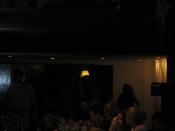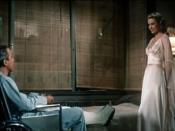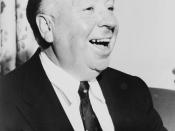In Alfred Hitchcock's classic film, Rear Window, Hitchcock clearly displays his negative view of voyeurism. The whole movie deals with Jeff's voyeuristic hobby, getting him involved in a murder of one of his neighbors. But even the first frames of the film, before he becomes involved with the murder, deal with symbols exemplifying Hitchcock's negative view of voyeurism. In the first scene we see Jeff's cast, a symbol that clearly demonstrates Hitchcock's anti-voyeuristic view. When looking closely, one could consider Jeff a voyeurist by profession: his whole career is based on trying to let readers take a look at the life of others. We discover that the reason why Jeff wears a cast is because his leg was broken while trying to get a good shot on a racetrack for his occupation. The injury and the cast sum up what the filmmaker's opinions are on taking voyeurism to the extreme.
A little later in the film, Stella tells Jeff that, "We've become a race of peeping Toms. What people should do is stand outside their own houses and look in once in a while"� (14). In this line of dialogue, the director uses Stella to express his beliefs about voyeurism. He believes that people have their own problems and should deal with them, rather than looking in at other people's troubles. A symbolic moment that shows these views is when Jeff's neighbor screams after finding out her dog has been killed. Jeff (along with the audience) look outside the window to see the dead dog lying on the walkway. The dog has been killed because it attempts to dig up part of Thorwald's dismembered body. The canine is not minding its own business (it represents Jeff's voyeuristic habits and could be considered a parallel character to...


